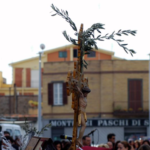Six years ago (1/11/15), in an interview in The Sunday New York Times Book Review, someone observed that “it takes four generations to heal one act of violence.” That amazing claim must surely lead us to think hard about daily events, from the brutality refugees endure, to war-driven famine, to the sexual abuse in homes in every nation. And our reflection can easily lead us to despair of any possibility of a future with hope.
Yet the claim also compels us to dwell on the Scripture readings for today. When, for example, St. Paul foresees the moment when the Lord will come accompanied by an army of angels; when he prays that we might grow in love for one another and for all, he is not preaching empty piety. Nor is the Son of God warning us of the days to come by using parabolic language we can ignore. The “blessed hope” we await, to quote the Liturgy, speaks to the sin that turns us so cold and indifferent that we live as if there were no God—as if the blood and water that flowed from Jesus’ pierced Heart were a sign of nothing but a Jewish man executed on a Roman cross.
Yet God does not mean for the endemic violence of domestic, economic, or political oppression to be the final word in human history. And when the Scriptures speak of growth in love, they reveal the plans of God for an end to the brutal human ruthlessness that gets passed on to the second, third and fourth generation in any land we care to name.
When he came the first time, the divine Son of God united himself, in a certain way, with each human being (see Gaudium et spes, no. 22). That union endures. So Jesus comes now to insist on our repentance from the evil done to him, and on our cooperation with the steadfast love God wants our world filled with now and always. Christ’s love makes radical demands. Nor does his future coming mean cold indifference goes unnoticed.
Even so, the Scriptures show us a vision of abiding love. We await “the blessed hope” that he will return to set things right and end cold, systemic, brutal human cruelty once and for all. And so we pray: “Our Father. … Your kingdom come. Your will be done…”




